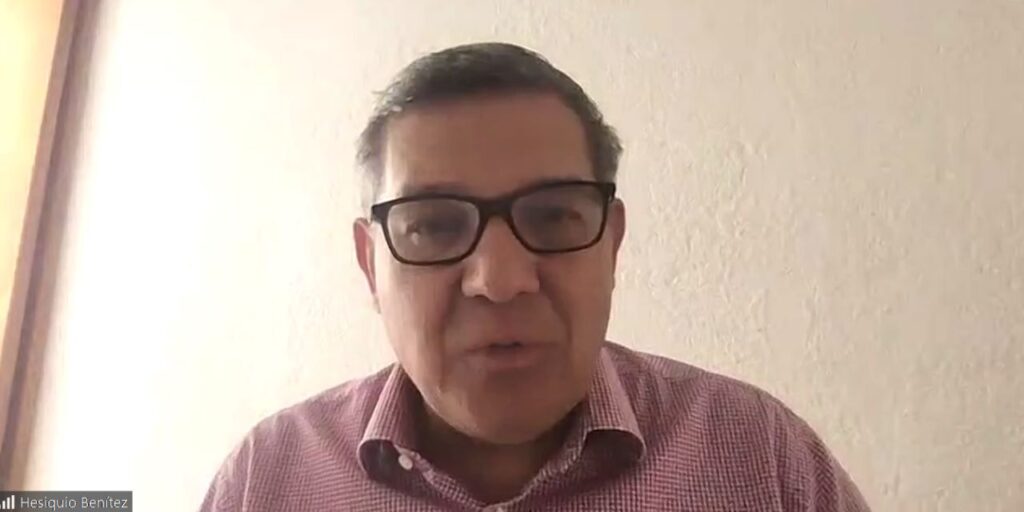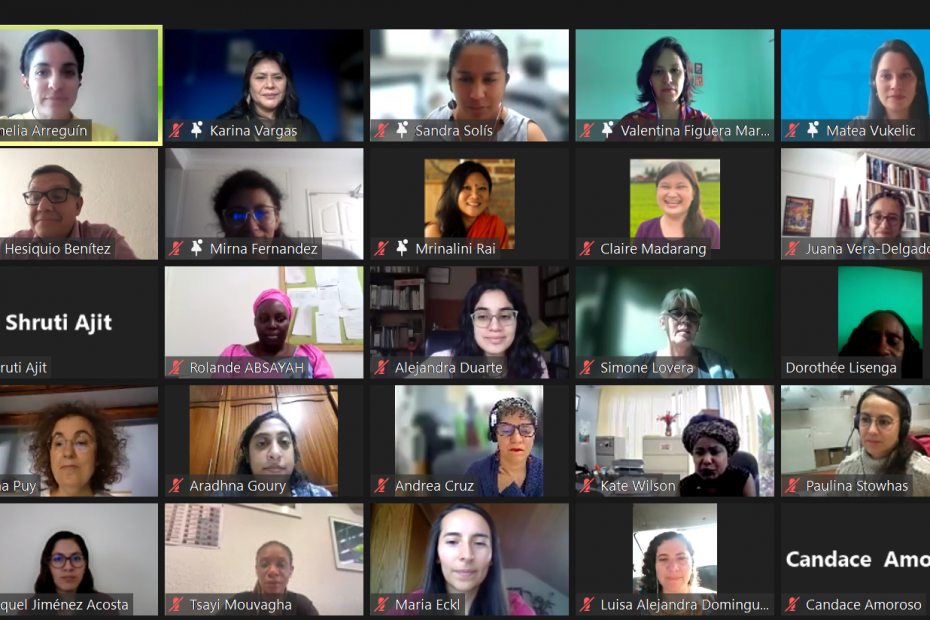#FromAgreementToAction
Due to concerns about the unbalanced nature of the current monitoring framework, which raises serious issues concerning human rights and gender justice, particularly in relation to land rights and participatory decision-making, and in the pursuit of strengthening the Monitoring Framework of the Kunming-Montreal Global Biodiversity Framework the CBD Women’s Caucus in collaboration with the Secretariat of the Convention on Biological Diversity, on Wednesday, 26th July 2023, along with various other organisations gathered to discuss “How to Gender-Responsively Monitor the Implementation of the KM Global Biodiversity Framework?”
This event aimed to provide essential support for the finalisation and operationalization of the monitoring framework for the Kunming-Montreal Global Biodiversity Framework (KMGBF) in line with decision 15/5. One of the primary objectives of this round table was to identify tangible entry points for integrating gender considerations into all indicators related to the 23 targets of the KM-GBF. In this blog post, we will delve into the key insights and discussions from this significant event.
With an esteemed panel of experts, including Jillian Campell from the CBD Secretariat, Matea Vukelic from UNEP-WCMC, Karina Vargas representing the ICCA Consortium, Juana Vera y Valentina Figuera from the Global Forest Coalition, Mirna Fernández from the Global Youth Biodiversity Network, Abigail Kitma from Tebtebba, and Mrinalini Rai from Women4Biodiversity, along with Amelia Arreguin, the coordinator of CBD Women’s Caucus, this virtual round table equipped participants with the essential insights and recommendations for gender-responsive monitoring within the framework. The valuable perspectives shared during the session laid the groundwork for fostering a more inclusive and equitable approach to biodiversity conservation.
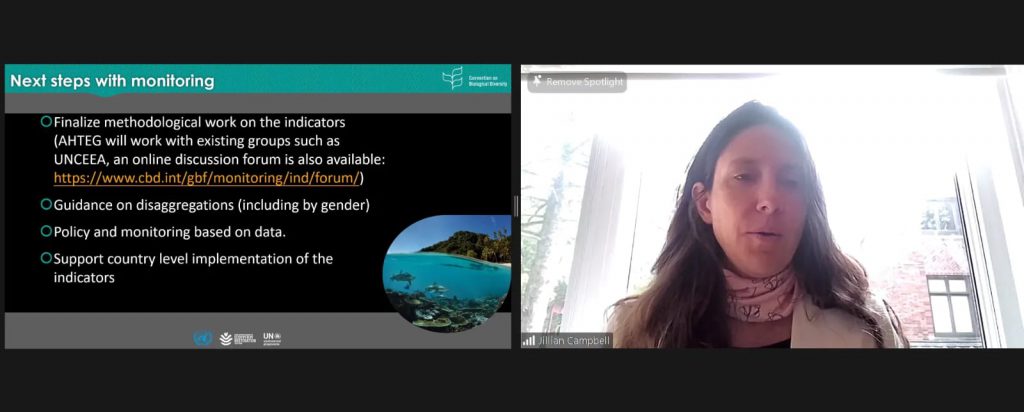
The session began with Jillian Campell, from the Secretariat of the CBD, setting the stage by explaining the overall process that the Monitoring Framework has experienced, and gave insight on which is the role of the Ad Hoc Technical Expert Group (AHTEG). Their activities include: Finalise methodological work on the indicators, Guidance on disaggregating (including by gender), among others. In this context, the current AHTEG approach to the binary indicators will include questions along the following lines: “Does your county have a policy or institutional arrangements for ensuring participatory, inclusive and gender-responsive decision-making for IPLCs? For women?” Binary indicators for Target 22, and Target 23 should involve participatory, inclusive, and gender-responsive decision-making, as well as Implementation follows a gender-responsive approach. So far there is a need for a comprehensive list of indicators to measure countries’ progress, and these indicators will be formulated as a series of questions in the national reports. The responses will be categorised not only as a simple yes or no but will include variations like “yes, fully,” “yes, partially,” “no, but planned,” or “no, with gaps.” This approach allows for more detailed and nuanced information, enabling the computation of Global level indicators based on specific criteria outlined in the Targets. Ms Campell concluded by recommending focusing on formulating the right questions in national reports to ensure accurate and valuable information is obtained for advancing gender-responsive monitoring in biodiversity conservation.
Please read the presentation here.
In a complementary manner, Matea Vukelic from UNEP-WCMC discussed the Monitoring Framework’s structure, which includes headline indicators, global scale or binary indicators, and component complementary indicators. These indicators will be used for planning, monitoring, and reporting the progress of the KMGBF’s implementation at the national level. However, she highlighted that the Monitoring Framework is not yet complete, with 12 indicators available now for development and seven targets lacking an adopted headline indicator. One of the crucial targets, Target 23, focuses on gender equality and gender-responsive implementation, but it currently only has a proposed binary indicator regarding women’s equal rights to land ownership and control. Matea suggested developing a comprehensive binary indicator that addresses the adopted gender plan of action with multiple categorical questions to measure progress effectively. She emphasised the significance of the gender plan of action in driving gender-responsive implementation and ultimately meeting Targets 22 and 23. The discussion on improving the monitoring framework, particularly the binary indicators, is currently ongoing within the Ad Hoc Technical Expert Group on indicators.
Please read the presentation here.
Target 3
Ms Karina Vargas from the ICCA Consortium emphasised the importance of a human rights-based approach to monitoring, given that the indicators are mainly quantitative and related. She pointed out that only one or two binary indicators are currently associated with Target 3, which calls for a more nuanced approach to capture the complexities of rights implementation. The lack of mention of the protection of IPs and LCs and traditional or ancestral territories as indicators in the global conservation framework was identified as a critical gap. To address this, Ms Vargas proposed the inclusion of an indicator related to the legal security of lands and territories of IPS and LCS as custodians of biodiversity. This would help to ensure that these territories, where 80% of the planet’s biodiversity is found, are effectively preserved and managed. Additionally, she stressed the need for gender-responsive data gathering and analysis and the inclusion of disaggregated data to better represent women’s contributions to conservation efforts. The recognition and protection of territories conserved and managed by IPs and LCs could aid in achieving the set target while also upholding the fundamental rights of indigenous people in these spaces. Finally, Ms Vargas highlighted the importance of guaranteeing the integrity of territories of life beyond set percentages, aiming for effective monitoring to support the management and governance of these spaces and active women’s participation
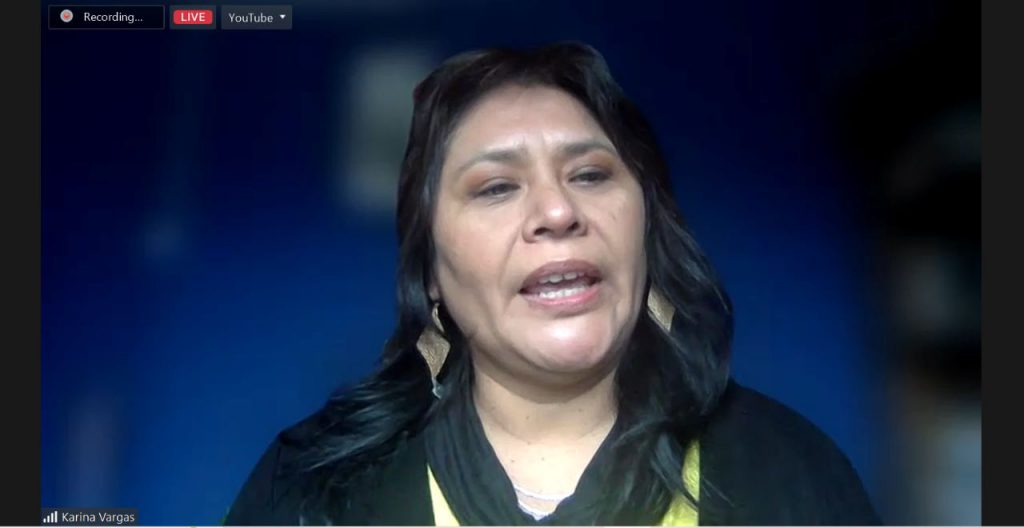
Please read the presentation here.
Targets 18 and 19
During their intervention, Juana Vera and Valentina Figuera from the Global Forest Coalition discussed Targets 18 and 19 of the Global Biodiversity Framework, focusing on resource mobilisation and harmful subsidies. They emphasised the need to eliminate and phase out harmful subsidies for biodiversity by 2025, aiming to reduce at least 5 billion USD per year by 2030. However, they expressed concern that harmful subsidies, such as those supporting monoculture plantations and fossil fuel use, far outweigh the funding allocated to biodiversity conservation. They raised issues regarding the impact of these subsidies on indigenous territories, women, and vulnerable communities. The presenters proposed complementary indicators to monitor secure access to financial resources and land for women, indigenous people, and small producers engaged in biodiversity conservation and sustainable use. They highlighted the importance of monitoring financial flows to make harmful subsidies and greenwashing practices visible, ultimately working towards a fair and equitable biodiversity financing system.
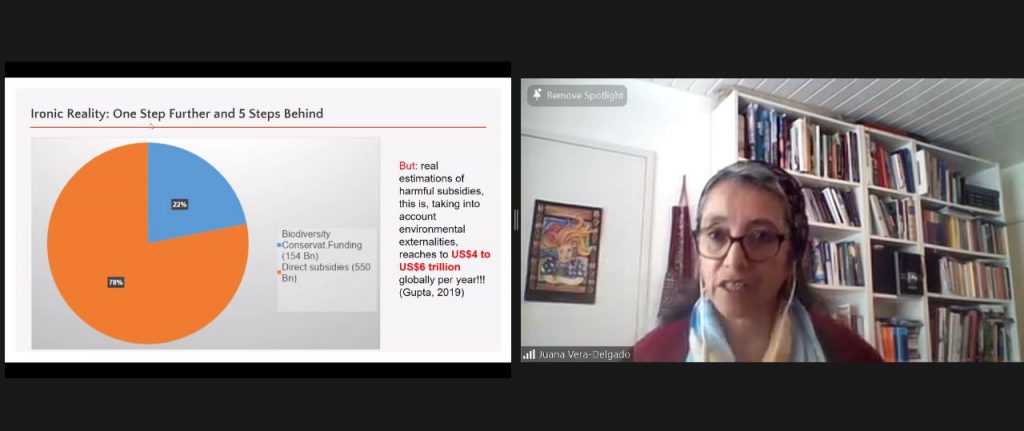
Please read the presentation here.
Target 21
On another note, Mirna Fernádez from the Global Youth Biodiversity Network acknowledged that Target 21 is complex, as it addresses various elements related to accessibility to information, traditional knowledge, communication, awareness raising, education, and management of research and knowledge. Ms Fernández highlighted the importance of free, prior, and informed consent in accessing traditional knowledge and stressed the need to understand and implement the concepts of accessibility, challenge rights, and vulnerable situations effectively. She also emphasised the significance of transformative education, lifelong learning, and diverse worldviews, particularly those of indigenous peoples and local communities. However, Ms Fernández expressed concerns about the lack of specific indicators for some critical aspects, such as gender-responsive data gathering and analysis, equitable knowledge transfer, gender-sensitive education, and gender-responsible awareness materials. She concluded that further proposals are needed to ensure a more comprehensive monitoring approach for Target 21 that aligns with a human rights based approach.
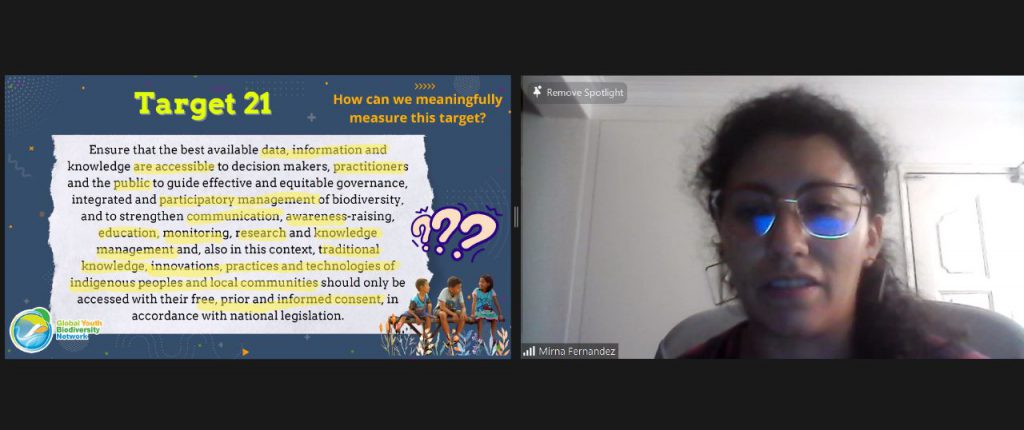
Please read the presentation here.
Target 22
Ms Abigail Kitma from Tebtebba emphasised that despite the recognized importance of participation in decision-making and human rights, there are still no headline indicators covering these crucial aspects in Target 22 of the Global Biodiversity Framework. The current suggested binary indicator for Target 22 needs to be more nuanced to capture the complexities of rights implementation. In the latest iteration of the monitoring framework, not all elements are covered in the indicators, leaving significant gaps in the assessment process. Moreover, there was not enough time in the COP 15 negotiations to cover headline indicators for all targets, including Target 22, which hampers the comprehensive monitoring of this critical area. Notably, the existing binary indicator falls short of capturing the intricate nuances of rights implementation. To ensure a more comprehensive assessment, Ms Kitma stressed the need for additional indicators on access to justice and information. She further emphasised the significance of gender-responsive data gathering and analysis, as well as the inclusion of disaggregated data for better representation. Throughout her presentation, Ms Kitma underlined various opportunities for influencing the monitoring framework, engaging in relevant discussions, and collaborating with like-minded allies. Ultimately, she urged for a more robust rights-based approach in the monitoring process to ensure the successful implementation of Target 22.
Please read the presentation here.
Target 23
As closing panellist, Ms Mrinalini Rai, from Women4Biodiversity, reflected on Target 23 highlighted there is a pressing need to address the gaps in the framework, since targets 22 and 23 have empty headline indicators, which poses a significant challenge to assessing progress and implementing relevant actions. The absence of a defined headline indicator for target 23 raises concerns about how parties will report on their progress and how the actions taken will be measured. The discussion should revolve, as suggested by Ms Rai, around identifying a suitable headline indicator and determining its guardianship, which requires time, funding, and support. It is crucial to finalise the indicator before completing the strategy to avoid missing out on vital elements and ensuring effective implementation. The ongoing efforts to review past peer reviews and gather relevant data from various submissions aim to contribute to the indicator development process. Collaborative efforts with allies, UN agencies, and statisticians are being made to address the issue and support the development of meaningful indicators. She concluded inviting the attendants to submit proposals around indicators to the portal, as it will facilitate informed discussions and decision-making within the AHTEG meetings and other relevant sessions.
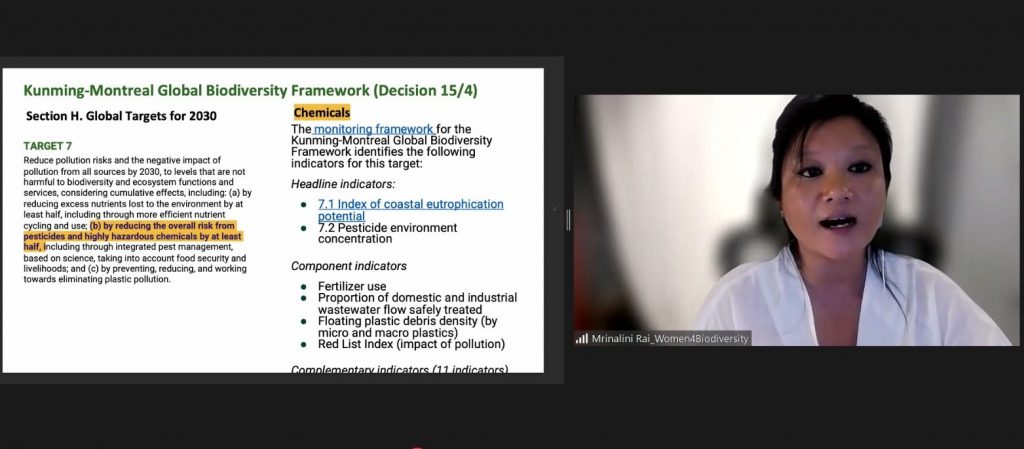
Please read the presentation here.
In conclusion, the virtual round table “How to Gender-Responsively Monitor the Implementation of the KM Global Biodiversity Framework?” held on July 26th, 2023, was a significant step towards strengthening the Monitoring Framework of the Kunming-Montreal Global Biodiversity Framework (KM-GBF). Concerns about the unbalanced nature of the current framework, particularly regarding human rights and gender justice, were addressed in collaboration with the CBD Women’s Caucus and the Secretariat of the Convention on Biological Diversity. The round table focused on identifying tangible entry points for integrating gender considerations into all indicators related to the 23 targets of the KM-GBF. With expert insights and recommendations, the event laid the groundwork for fostering a more inclusive and equitable approach to biodiversity conservation. Notably, discussions around Targets 22 and 23 highlighted the urgent need to address gaps in the monitoring framework, with empty headline indicators posing challenges in assessing progress and implementing relevant actions. Efforts are underway to develop comprehensive binary indicators and secure funding and support for the indicator development process. The ongoing collaboration among various organisations, experts, and stakeholders will play a crucial role in advancing gender-responsive monitoring within the KM-GBF, ensuring the effective conservation and sustainable use of biodiversity.
